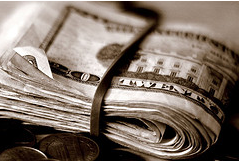If You’re Unhappy & You Know It, Keep An Eye On How You Spend Your Money
Pick your head up out of that pint of Ben & Jerry’s and step away from the online sales you’ve been clicking through to fill that hole in your heart. A new study claims that when you’re down in the dumps, sad or otherwise singing the blues, you’re more prone to make silly decisions about your money. And come on, you don’t really need another pair of black boots.
Professors at Harvard, Columbia and University of California Riverside conducted a study that found bummed out people will often pass up the chance to get extra money in the future in order to get just a little bit of money right away, reports CNNMoney. Which helps me account for my post-The Notebook watching sessions and subsequent dip in the checking account, at least.
In the study, when sad people were offered smaller amounts of cash right away or the option to hold out for bigger payouts in the future, they accepted 13% to 34% less money on the spot than their happier counterparts. Having to wait for money was just something the sad people couldn’t bear to think about, apparently.
“The idea is that when you’re sad, you want to accelerate consumption — it’s all about getting money sooner,” said a co-author of the report.
(Here’s where I make a joke about accelerated consumption related to that aforementioned ice cream. Brain freeze, etc.)
The experiments included participants who were designated as neutral, disgusted or sad, states that were induced in various ways:
To induce sadness, participants were asked to view a three-minute clip from the movie, The Champ,* where a boy watches his father and mentor die in front of him. Neutral participants watched underwater scenes of the Great Barrier Reef, while participants in the disgusted condition watched a clip from Trainspotting showing a man reaching into a filthy toilet.
One experiment showed that the median rate a sad participant would accept immediately was $37 instead of waiting three months for $85, while the median neutrals wanted $56 right away. In another, the sad group wanted $65 today instead of $100 in three months, and neutrals demanded at least $74 right now.
The term for this foolish money view was dubbed “myopic misery” by the researchers, a state where”sadness creates a myopic focus on obtaining now versus later” even if you lose out in the long run.
So why the disgusted group? Researchers wanted to see if it was any negative emotion that would lead to myopic misery, but that group worked more like the neutral participants.
“People typically make some of the most consequential choices of their lives while in emotional states,” the research report states. “Our results suggest that [sad] individuals might exacerbate their financial hardship by making intemporal choices that favor immediate consumption more than is wise.”
Researchers never forked over the cash so how the participants would use it can’t be determined. Researchers think, however, that the people who wanted money right away would likely spend it, as well. Ah, scientific proof that “retail therapy” is an actual phenomenon.
*An interesting bit of background on The Champ (starring a tiny Ricky Schroder, it should be noted) being used in scientific experiments where people need to get sad, thanks to Consumerist reader Joh can be read over at Smithsonian Magazine.
Feeling sad? Be careful with your money [CNNMoney]
Want more consumer news? Visit our parent organization, Consumer Reports, for the latest on scams, recalls, and other consumer issues.


